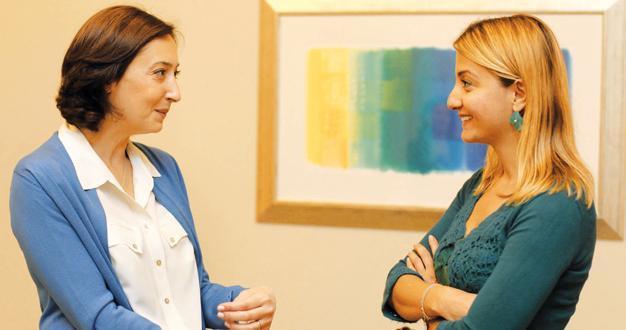Princess: Syrian refugees challenging for Jordan
ISTANBUL - Hürriyet Daily News

Jordanian Princess Rym Ali (L) tells Hürriyet Daily News correspondent İpek Yezdani that hosting 120,000 Syrian refugees are challenging for Jordan.
The accelerating number of Syrian refugees in Jordan will undoubtedly prove challenging for the country, which faces limited resources, Jordian Princess Rym Ali said.“Jordan is a country with limited resources. Shortage of water has always been a problem in Jordan. I do hope that the international community will be sensitive to the fact that there will be a need for of some international help”, Ali told the Hürriyet Daily News in a recent interview.
Ali visited Turkey to attend the “Alliance of Civilizations” forum held by the Turkish Prime Ministry in Istanbul. Speaking to the Daily News on the sidelines of the conference, Ali said Jordan has traditionally been a land where people have escaped from conflicts.
“We have witnessed many refugees in the past from Iraq, Palestine, etc. I am sure everybody is doing their best to provide the best conditions for the refugees but it is probably going to be challenging,” Ali said.
Jordan, which is one of the world’s 10 driest countries, is hosting up to 120 thousand Syrian refugees right now.
“I would like to cover the Arab awakening”
Earlier in her career, Ali worked at the international media organizations such as BBC World Service, United Press International, Bloomberg International, Radio Monte Carlo Moyen Orient and CNN.
Although her life is as hectic as it was during her journalism days, Princess Ali said sometimes there are some good stories that she would like to cover.
“For instance sometimes you meet someone and you think that you would like to make an interview with her or make a profile of her. I have to admit, when I watch the pictures on TV, [the] Arab Awakening is also a story that I would like to cover,” Ali said.
Ali has been the founder of the Jordan Media Institute, a non-profit body whose aim is to establish an Arab Center of Excellence for Journalism Education. She believes the Arab Spring will also bring some new developments in the media field to the region.
“We have so many TV satellite channels in the region. There are private ones and government ones. I hope we can expect some change in the future. Maybe the Arab Spring will offer that opportunity and with this new freedom in some of these countries where the media was really a government mouth piece, they will now move to be more in public service, which is very badly needed in our part of the world. There is a place of course for corporate and private media, but there is also a place for public media, not [media] as a government mouth piece,” Ali said.
Ali thinks it is the media’s responsibility to draw attention to the situation of women in the region.
“I feel very lucky and privileged because when I joined the Royal family, I realized that there is a tradition of women in the Royal family who have worked to help other women. Obviously this doesn’t mean that everything has been achieved, there is still a lot that we can do. And the media should be a good instrument to highlight the situation of women”, Ali said.
Ali has been married to Prince Ali bin Al Hussein of Jordan since 2004.
















